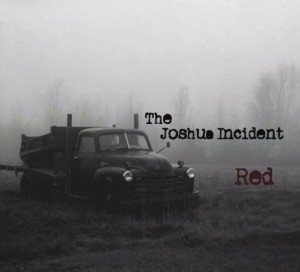 Fans of acoustic, roots, and folk music won’t be able to get enough of The Joshua Incident’s debut album, Red. Natural acoustic instruments provide plenty of gritty picking styles, tender melodies, and atmospheric moods while lush, full vocal harmonies carrying one away like a magic carpet ride.
Fans of acoustic, roots, and folk music won’t be able to get enough of The Joshua Incident’s debut album, Red. Natural acoustic instruments provide plenty of gritty picking styles, tender melodies, and atmospheric moods while lush, full vocal harmonies carrying one away like a magic carpet ride.
The Portsmouth, New Hampshire quartet open this album with “Hanging Tree,“ which features one of the grittiest, most tender pedal steel melodies this side of the Mississippi. Singer Ann Norton and guitarist Todd Thurlow perform this duet with voices that blend better than peanut butter and jelly. Norton’s high, pretty vocal emotes the sorrow of this tune while Thurlow’s warm husk keeps it earthy and real, grounded in his somewhat lower register. Thurlow, who writes all of the songs, presents lyrical imagery that buttresses the serious tone of this number. One can feel the final anxiety of the condemned man as he nears the hanging tree, which seems to be staring right back at him.
“Our Own Highway Song” follows a mellow path as it offers an introspection on traveling across the country on a road trip. It is also a touching testament to the relationship between two travelers, indicating how content they are together throughout their long, long drive. Tender bits of acoustic guitar notes form a solid stillness, setting the scene as they contemplate images and impressions along their journey. An undercurrent of pedal steel emotes on a sublime level, further hinting at the depth of the connection between the two travelers. Norton and Thurlow sing with a seriousness of purpose as they take it down tempo, sharing the lyrics as much as singing them.
“Elizabeth” gets a bit of a country music flavoring from some twang in Dan Beller-McKenna’s persistently pretty and tender pedal steel melodic line. One could almost swing dance to the twists and turns in his notes. Meanwhile, the voices here take their turns in a gentlemanly and ladylike manner, courteous, shifting politely from Thurlow’s low smooth timbre to Norton’s higher, pretty, girlish playfulness. An acoustic guitar strum from Thurlow and a gentle bass push from John “Hal” Halstead’s upright give this whole thing a pleasant pulse.
“Glass Jar” is a perfect metaphor for the frustration of being in a relationship with an unhappy, weak person. One loves out of compassion and duty while also wishing to be away, away from the anchor of gloom and misery one unwittingly got attached to. Musically, the band completes the emotional picture. The voices sing in a tender vocal application, milking the emotion in each verse without ever overplaying them. Thurlow’s husky, homey drawl infuses the lyrics with another layer of emotion. All the while, Beller-McKenna’s pedal steel practically sings it own melodic joys, bittersweet, committed, forlorn. This song does a wonderful job of expressing mixed emotions while remaining a darn good folk song.
“Time And Space” loads its mid-tempo cruise with lots of grit from the instrumentalists. Guest banjo player Keith Hillyard, Thurlow, and Beller-McKenna offer up plenty of acoustic kernels, each note percolating and weaving into a running tapestry that makes the listener feel the vast amount of time that a relationship took up. The voices sing at a perky pace, which belies the seriousness of loss and heartache, all while the instrumentation wraps it in the perfect sentiment.
“Past Perfect” is a lyrically deep song. While it is clearly about a moment in time, when a relationship was wonderful, intimate, “Past Perfect” conjures many feelings and images of loss. Lyrics like “Remembering the sweetest wine/Stolen like a kiss” conjures a notion of an entire relationship being like a stolen kiss, something one couldn’t have without briefly snatching it up. The somber delivery of the words, slow, wistful, accompanied by a lonesome acoustic guitar letting its feelings show in halted unveilings, turn this tune into something a listener cannot ignore but is rather compelled to follow carefully.
The wittily titled “Passed Out As Quickly As I Could,” finds Thurlow contemplating a past love that was once picture perfect. He cannot face the loss he is suddenly forced to reckon with, so he drinks himself unconscious. The somber reality, reverie turned nightmare, comes to vivid life on the strength of a lonely pedal steel melody. Its bittersweet melodic phrase speaks volumes of its own while Thurlow’s handsome low tenor contrasts well with its considerately paced croon.
Title track “Red” centers around a tragic automobile accident that took place in Thurlow’s youth. A young man that liked to zip around in his vehicle may have missed a curve, or missed something, and didn’t survive. The musicians and vocalists present this in a quiet, reflective mood. The singers practically drawl out the lyrical images, the wreck, black streaks on the pavement, a friend becoming a memory. They certainly make you fee it as they carefully unfurl this tale of youthful zeal turned to doom, destruction, and great personal loss.
“Quiet And Discontent” is a dandy of a wistful tune. The singer cannot keep the girl of his dreams in one place for too long. Yet, what he does get out of the relationship still has meaning and significance. Fleeting moments of companionship inspire a heart full of feeling. Well considered harmony vocals put plenty of emphasis on the ambiguous joy of this song. It certainly doesn’t hurt to have a pedal steel player like Beller-McKenna pressing out the sublime meaning of the tune with his emotive melodic line, one that travels around free as bird, emitting its quiet beauty on an artful level.
Heading back into country flavorings, “Thimble Full Of Happiness” features the pedal steel treading old time timbres and tones. The vocals have a touch of honky tonk that adds beautifully to the atmosphere of this ode to a wrecked, ruined relationship. There is also plenty of wit: “When you told me to stuff it/I took it literally/Now your suitcase sits on my front porch/With that damned Christmas tree.” The bouncy, almost jaunty pace of this number also makes it a fun, toe-tapping number. One can picture this couple arguing back and forth inside a trailer.
The folk quartet move on to the quiet, understated “December Girl.” Images of winter time, holidays, and loss commingle with tender vocals and a forlorn pedal steel melody. The Joshua Incident, again, create the perfect atmosphere and mood for their message. One cannot help but feel what the lyricist must have been feeling when he wrote this.
The Joshua Incident close out their beautiful album with the wistful “Tinderbox.” The pedal steel drawls the main melody line with a haunted, sorrowful mourning quality. Thatched with acoustic guitar strums and an understated bass line, the music wraps warmly and tenderly around the vocals. Here, the male and female voices conjure the sadness that threatens to explode in an “acetylene wind.” The entire band do a marvelous job conjuring the sense of having a harrowing encounter with a fate that will leave someone with mighty disappointment and heartache.
The Joshua Incident have created with this Red album an impressive, interesting, and wholly realized document of all they have to offer their listeners. Its offering of honest to goodness folk music idioms and traditions and literary lyrics can transport their listeners to other places and times in American history. Moreover, it is refreshing to hear such good music created organically with acoustic instruments and voices. It also helps to have a universal quality to their songs. “Hanging Tree,” for example, could probably become a hit among fans of folk, rock and roll, pop, and singer-songwriters. One can only hope their next album comes out soon.

